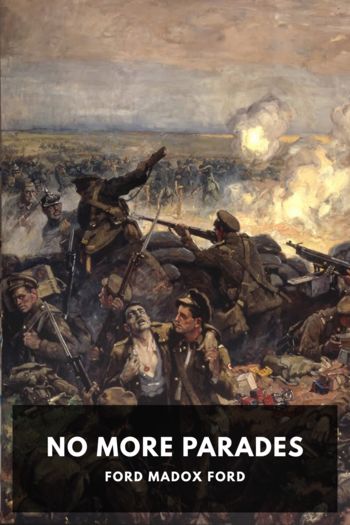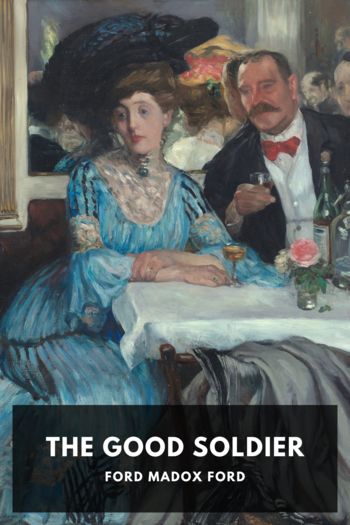Some Do Not … by Ford Madox Ford (story read aloud txt) 📕

- Author: Ford Madox Ford
Book online «Some Do Not … by Ford Madox Ford (story read aloud txt) 📕». Author Ford Madox Ford
From teatime that day until it was time to catch the midnight train for Bishop’s Auckland he had been occupied with his son Mark in the writing-room of the club. They had made many notes. He had seen his son Christopher, in uniform, looking broken and rather bloated, the result, no doubt, of debauch. Christopher had passed through the other end of the room and Mr. Tietjens had avoided his eye. He had caught the train and reached Groby, travelling alone. Towards dusk he had taken out a gun. He was found dead next morning, a couple of rabbits beside his body, just over the hedge from the little churchyard. He appeared to have crawled through the hedge, dragging his loaded gun, muzzle forwards, after him. Hundreds of men, mostly farmers, die from that cause every year in England. …
With these things in his mind—or as much of them as he could keep at once—Mark was now investigating his brother’s affairs. He would have let things go on longer, for his father’s estate was by no means wound up, but that morning Ruggles had told him that the club had had a cheque of his brother’s returned and that his brother was going out to France next day. It was five months exactly since the death of their father. That had happened in March, it was now August: a bright, untidy day in narrow, high courts.
Mark arranged his thoughts.
“How much of an income,” he said, “do you need to live in comfort? If a thousand isn’t enough, how much? Two?”
Christopher said that he needed no money and didn’t intend to live in comfort. Mark said:
“I am to let you have three thousand, if you’ll live abroad. I’m only carrying out our father’s instructions. You could cut a hell of a splash on three thousand in France.”
Christopher did not answer.
Mark began again:
“The remaining three thousand then: that was over from our mother’s money. Did you settle it on your girl, or just spend it on her?”
Christopher repeated with patience that he hadn’t got a girl.
Mark said:
“The girl who had a child by you. I’m instructed, if you haven’t settled anything already—but father took it that you would have—I was to let her have enough to live in comfort. How much do you suppose she’ll need to live in comfort? I allow Charlotte five hundred. Would five hundred be enough? I suppose you want to go on keeping her? Three thousand isn’t a great lot for her to live on with a child.”
Christopher said:
“Hadn’t you better mention names?”
Mark said:
“No! I never mention names. I mean a woman writer and her daughter. I suppose the girl is father’s daughter, isn’t she?”
Christopher said:
“No. She couldn’t be. I’ve thought of it. She’s twenty-seven. We were all in Dijon for the two years before she was born. Father didn’t come into the estate till next year. The Wannops were also in Canada at the time. Professor Wannop was principal of a university there. I forget the name.”
Mark said:
“So we were. In Dijon! For my French!” He added: “Then she can’t be father’s daughter. It’s a good thing. I thought, as he wanted to settle money on them, they were very likely his children. There’s a son, too. He’s to have a thousand. What’s he doing?”
“The son,” Tietjens said, “is a conscientious objector. He’s on a minesweeper. A bluejacket. His idea is that picking up mines is saving life, not taking it.”
“Then he won’t want the brass yet,” Mark said, “it’s to start him in any business. What’s the full name and address of your girl? Where do you keep her?”
They were in an open space, dusty, with half-timber buildings whose demolition had been interrupted. Christopher halted close to a post that had once been a cannon; up against this he felt that his brother could lean in order to assimilate ideas. He said slowly and patiently:
“If you’re consulting with me as to how to carry out our father’s intentions, and as there’s money in it you had better make an attempt to get hold of the facts. I wouldn’t bother you if it wasn’t a matter of money. In the first place, no money is wanted at this end. I can live on my pay. My wife is a rich woman relatively. Her mother is a very rich woman. …”
“She’s Rugeley’s mistress, isn’t she?” Mark asked.
Christopher said:
“No, she isn’t. I should certainly say she wasn’t. Why should she be? She’s his cousin.”
“Then it’s your wife who was Rugeley’s mistress?” Mark asked. “Or why should she have the loan of his box?”
“Sylvia also is Rugeley’s cousin, of course, a degree further removed,” Tietjens said. “She isn’t anyone’s mistress. You can be certain of that.”
“They say she is,” Mark answered. “They say she’s a regular tart. … I suppose you think I’ve insulted you.”
Christopher said:
“No, you haven’t. … It’s better to get all this out. We’re practically strangers, but you’ve a right to ask.”
Mark said:
“Then you haven’t got a girl and don’t need money to keep her. … You could have what you liked. There’s no reason why a man shouldn’t have a girl, and if he has he ought to keep her decently. …”
Christopher did not answer. Mark leaned against the half-buried cannon and swung his umbrella by its crook.
“But,” he said, “if you don’t keep a girl what do you do for …” He was going to say “for the comforts of home,” but a new idea had come into his mind. “Of course,” he said, “one can see that your wife’s soppily in love with you.” He added: “Soppily … one can see that with half an eye. …”
Christopher felt his jaw drop. Not a second before—that very second!—he had made up his mind to ask Valentine Wannop to become his mistress that night. It was no good, any more, he said to himself. She loved him, he knew, with a deep, an unshakable passion, just as his passion for her was a devouring element that covered his whole mind as the atmosphere





Comments (0)